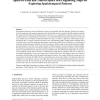2186 search results - page 26 / 438 » Considering an Organization's Memory |
ESANN
2003
13 years 9 months ago
2003
Abstract. This paper considers the general problem of function estimation with a modular approach of neural computing. We propose to use functionally independent subnetworks to lea...
ADVCS
2011
12 years 7 months ago
2011
Two distinct learning mechanisms are considered for a population of agents who engage in decentralized search for the common optimum. An agent may choose to learn via innovation (...
EAMT
1993
13 years 11 months ago
1993
Daelemans W. Abstraction Considered Harmful: Lazy Learning of Language Processing. Proceedings of the 6th 5th Belgian-Dutch Conference on Machine Learning 1996; 3-12.
POPL
1994
ACM
13 years 11 months ago
1994
ACM
Heap allocation with copying garbage collection is believed to have poormemory subsystem performance. We conducted a studyofthememory subsystem performance of heap allocation for ...
CGF
2010
13 years 7 months ago
2010
Spatiotemporal data pose serious challenges to analysts in geographic and other domains. Owing to the complexity of the geospatial and temporal components, this kind of data canno...

